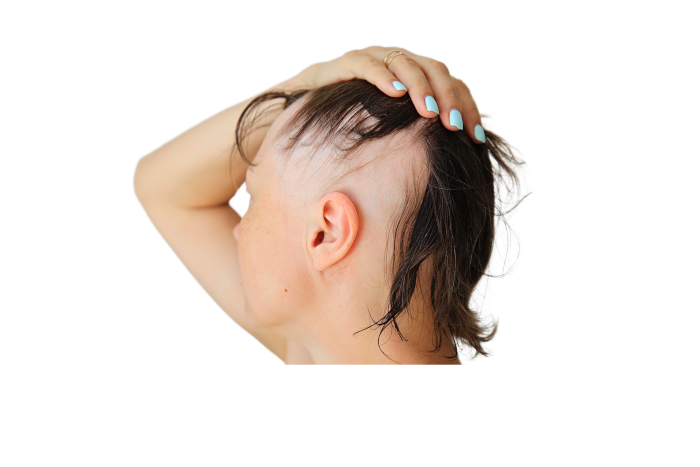Alopecia Areata is an uncommon skin condition. As a result, patients struggle to find effective treatments. We understand the frustration of dealing with Alopecia Areata. At the Trillium Clinic, our clinical solutions are designed to target Alopecia Areata at its root, helping your immune system re-balance, and restore your natural hair.
What is

Alopecia areata is a condition where a person’s hair falls out in patches. The hair loss in alopecia areata usually happens on the scalp, but it can also occur on other parts of the body, like eyebrows, eyelashes, or the body. The size of the bald patches can vary from small spots to larger areas. In some cases, the hair may grow back on its own, but for others, it may take a long time or possibly not grow back at all. Sometimes, the hair loss and regrowth can happen more than once.
What causes
It is an autoimmune disease, which means the body’s immune system mistakenly attacks the hair follicles, causing the hair to stop growing and fall out. It can affect people of all ages, including children.
How is it treated
While there is no known cure for alopecia areata, there are treatments available to stimulate hair growth and manage the condition. These treatments can include topical medications, injections, or other therapies. It’s important to note that the effectiveness of these treatments can vary from person to person, and results may not be guaranteed. It’s important to consult with a dermatologist to determine the best treatment options for you.
Corticosteroids: These are medications that can be applied topically (creams or ointments), injected into the affected areas, or taken orally (by mouth). Corticosteroids help to reduce inflammation and suppress the immune system’s attack on the hair follicles, promoting hair regrowth.
Topical Minoxidil: Minoxidil is a medication that can be applied directly to the scalp to stimulate hair regrowth. It is available over-the-counter in the form of a foam or solution.
Anthralin: This medication is applied topically to the affected areas and helps to modulate the immune response, allowing hair to grow back.
Immunotherapy: This involves applying certain chemicals to the scalp to provoke an allergic reaction. The intended effect is to stimulate hair regrowth by redirecting the immune system’s response away from attacking the hair follicles.
Hair Transplantation: In cases where hair loss is more extensive, hair transplantation can be considered. This procedure involves taking healthy hair follicles from one part of the body and transplanting them into the bald areas.
Systemic medication: JAK inhibition is a newer treatment approach for alopecia areata that shows promise in promoting hair regrowth. JAK inhibitors are medications that target a group of enzymes called Janus kinases (JAKs) that play a role in the immune system’s response. In the case of alopecia areata, it is believed that the immune system mistakenly attacks the hair follicles, leading to hair loss. JAK inhibitors work by blocking the activity of these enzymes, which helps to modulate the immune response and reduce inflammation. Recent studies have shown that certain JAK inhibitors, such as tofacitinib and ruxolitinib, when taken orally, can lead to significant hair regrowth in some people with alopecia areata. However, it’s important to note that JAK inhibitors for alopecia areata are still being investigated, and their long-term safety and effectiveness are still being studied. The use of JAK inhibitors for alopecia areata is typically reserved for individuals with moderate to severe forms of the condition or when other treatments have been unsuccessful. It requires close monitoring by a dermatologist or healthcare professional due to potential side effects and safety considerations. As research continues, JAK inhibition may offer a promising option for the treatment of alopecia areata, but it’s important to consult with a healthcare provider to understand the current state of research, potential risks, and benefits associated with this treatment approach.
Embark on your journey to radiant skin
Alopecia areata treatment plans may vary depending on the severity of the condition and individual needs. We invite patients from Chapel Hill, Carrboro, Hillsborough, Pittsboro, Mebane, Durham, Burlington, Cary, and surrounding cities, who suffer from alopecia areata, to schedule an appointment with us here. We will conduct a comprehensive evaluation of your alopecia areata and then, together, we will explore the various options so that we find the alopecia areata treatment that is best suited for your specific situation.

